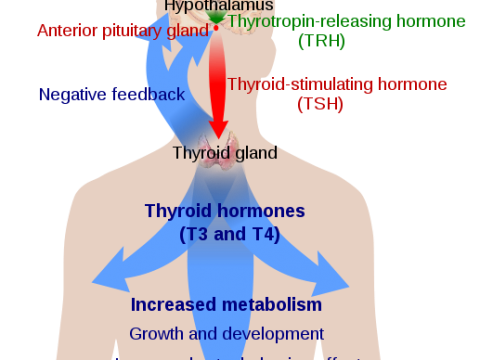Thyroid Disease Can Cause Complications
Thyroid disease can cause complications during a pregnancy that pose a risk to both the mother and baby. While some women develop the disease during or after pregnancy, others have the disease before becoming pregnant. If you have a thyroid condition, and have recently found out you are pregnant, discuss the possible risks and complications with your doctor. It is important that women receive treatment for a thyroid condition during pregnancy, to protect the health of both the mother and baby.

What is thyroid disease?
The thyroid is a gland located in front of the windpipe, in the neck. It has a butterfly-shaped appearance and is responsible for producing the hormone known as thyroxine, or T4. The thyroid gland has a significant impact on a woman’s overall health, as it is has an effect on metabolism, muscle strength, cholesterol, breathing and menstrual cycles. Sometimes the thyroid produces too much or to little thyroxine. If the gland is overactive and produces too much hormone, the condition is called hyperthyroidism. If the gland produces to little hormone, the condition is called hypothyroidism.
What are the symptoms of thyroid disease?
Women who are pregnant may experience certain symptoms of thyroid disease such as weight gain, hot flashes or constipation, but may confuse those with the normal symptoms of pregnancy. If you experience any of the following symptoms, consult with your health care professional about being tested for a thyroid condition.
Hyperthyroidism Symptoms
- Restlessness
- Hot flashes
- Weight loss
- Difficulty concentrating
- Diarrhea
- Rapid heartbeat
- Sensitivity to heat
- Insomnia
Hypothyroidism Symptoms
- Fatigue
- Excessive weight gain
- Constipation
- Depression
- Sensitivity to cold
- Muscle weakness
- Exhaustion
What causes thyroid disease?
Hyperthyroidism is often caused by Grave’s disease, an autoimmune disorder. When a woman has Grave’s disease, her body’s immune system attacks healthy cells and tissues. The body makes an antibody known as TSH, or thyroid stimulating immunoglobulin, which causes they thyroid to produce too much thyroid hormone. Hyperthyroidism may also be caused by hyperemesis gravidarum (severe vomiting and nausea) in rare cases.
Hypothyroidism is often caused by Hashimoto’s disease during pregnancy. With this disease, the body creates antibodies that interfere with the thyroid gland’s ability to produce thyroid hormones. This can cause a decreased production of thyroid hormones.
What are the risks of thyroid disease?
If left untreated, thyroid disease can cause health risks to both the mother and baby. The mother-to-be may experience high blood pressure (preeclampsia), miscarriage, preterm labor, postpartum hemorrhage and congestive heart failure. During the first 10 to 12 weeks of gestation, the baby relies on the mother’s body for thyroid hormones. If the mother has a thyroid condition, it can cause conditions in the baby, including low-birth weight, stillbirth, fast heart rate, congenital malformations and impaired mental development.
How is thyroid disease treated?
Many medications for treating a thyroid condition are safe to use during pregnancy. However, radioactive iodine, which is used in the treatment for hyperthyroidism, is not safe for use during pregnancy. For hyperthyroidism, the mother will be prescribed a drug that interferes with the body’s ability to produce the thyroid hormone. Women with hypothyroidism may be given a synthetic form of the thyroid hormone, thyroxine. Women should receive routine testing during pregnancy to check thyroid hormone levels if they have thyroid disease.
Thank-you for reading this article. Please feel free to leave your thoughts in the comment section below.
References: